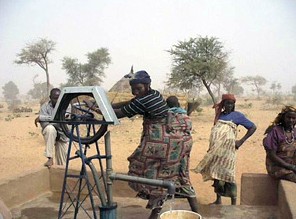
In many cases around the world, government officials and others have taken a top-down approach in introducing new water systems, including erroneously assuming—or even mandating—that people use water for only a single purpose. For example, only for domestic use in the home or for productive uses such as crop irrigation and livestock.
A better approach, the U.S. Agency for International Development (USAID) and its partners have found in recent years, is to develop "multiple-use" water services or systems (MUS). With a MUS approach, planners presume that people need water—and will use it—for a range of purposes, from drinking and cooking in the home to generating income from farming and other economic activities.
In the West African country of Niger, that MUS approach has certainly made a difference to Hadiza Ali and her husband, Ali Mohammed. The two of them and other family members live in the village of Kabori, in the administrative region of Zinder, in southern Niger.
In the past, Hadiza used to walk six times a day to collect water from a traditional well. That well provided drinking water for both humans and livestock. The well opening is at ground level and so any spilled water and rain water could carry dirt and animal waste back into the well. That increased the chances that diarrhea-causing waterborne illnesses would be spread, especially to the village's children.
Now, with a new water supply developed with support from USAID and Coca Cola, Hadiza no longer walks to the traditional well. Instead, she uses a rope pump that is much closer to her home and that provides cleaner, safer water.
Her husband has also benefitted from an improved water supply. Before, Ali used to draw water from a well and then carry it to each plant individually. "The difficulty of watering plants kept us from growing other crops," he says.
Ali now waters his garden using a new treadle pump and a series of irrigation canals. Ali has doubled the size of the garden and added new crops, including onions, cabbages, and lettuce. The garden now provides the family a year-round source of nutrition and increased income.
The project serving Kabori and other Zinder communities has been implemented for USAID by Winrock International, a U.S.-based nonprofit organization, since late 2008. Called Water for Health and Wealth: Multiple-Use Water Services in Niger, the Winrock program has so far improved water access for more than 13,500 people, helped over 80 gardeners increase their crop yields, provided hygiene training for more than 17,000 persons, and installed and provided training for seven experimental aquaculture ponds.
Besides improving health conditions, the MUS project has generated new employment in the Zinder region. Both the rope pumps and the treadle pumps are manufactured locally, using completely local materials.
The locally manufactured pumps have proved to be much more reliable than hand pumps that some other organizations have installed elsewhere in Niger. Hand pumps provide safe water but can be difficult and expensive to maintain. Some replacement parts for the hand pumps that are common in Niger cost over $500. That is far beyond the resources of most villagers, many of whom survive on less than $2 per day, earned from farming and raising livestock. In contrast, repairs to the new Zinder pumps can be made by local metalworkers, with spare parts costing under $25.
Winrock's multiple-use strategy in Niger was based on a systematic cost-benefit assessment of single-use versus multiple-use water services and their potential suitability for South Asia and sub-Saharan Africa. Winrock completed that study in 2007, with financing from the Bill & Melinda Gates Foundation. The results of that evaluation indicated that while multiple-use services can initially cost more than single-use systems, they offer significant advantages over the long term.
Hadiza and Ali have certainly seen the benefits for their village. "We like the project," says Ali, "because we can improve our lives. You help us at first, and we can continue to improve."







Comment
Make a general inquiry or suggest an improvement.